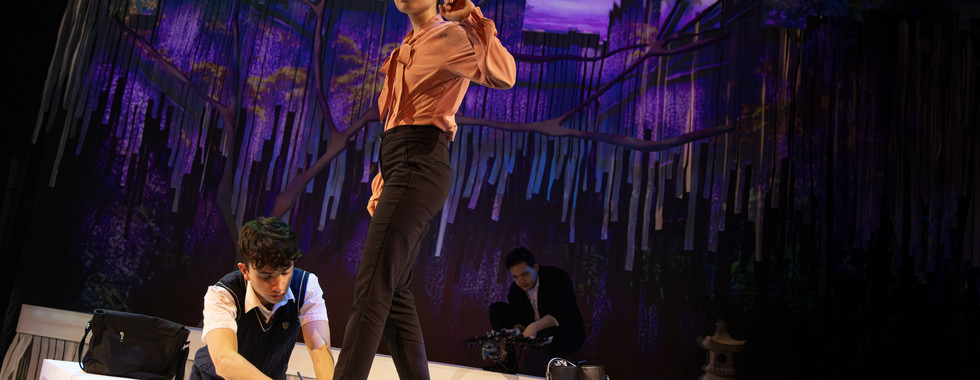The Garden of Words - Park Theatre
- Henry Longstaff

- Aug 16, 2023
- 3 min read
Abundant imagination undone by a malnourished script

★★☆☆☆
The adaption of Makoto Shinkai’s film and novel continues the trend of Japanese anime being translated to the London stage. With the RSC’s ‘My Neighbor Totoro’ leading the way and ‘Spirited Away’ arriving soon, this is an exciting time for Japanese and East Asian theatre. Whilst the visuals in this rendering are evocative and vibrant, proudly demonstrating its anime roots, sadly the script struggles to demonstrate any clear characterisation and the piece stutters through stagnant dialogue.
The lonely tranquillity of the piece is evident from its preset. A single, yet lush tree stands amongst the sharp edges of the concrete, Cindy Lin (set and costume), Rajiv Pattanni (lighting) and KENNY (Video projection) stating their intent for the timbre of the piece in unison. The sound design from Nicola T. Chang and composition from Mark Choi soothe the soul, its ethereal soundscape otherworldly, all the design elements retaining the play's cinematic sense of possibility.
Beyond the design work the piece neatly thrives in its space, refusing to charge from scene to scene, it instead takes its time, pausing for a moment to breathe and reset before continuing. But it is in these scenes where the cracks steadily form. Takao (Hiroki Berrecloth), a 15-year-old schoolboy has been raised by his single mother and his older brother, the former often absent and the latter bitter for sacrificing his dreams to support the family. Takao obsesses over shoes, yearning to take up an apprenticeship in Italy and become a shoemaker. He exists in isolation, never having found his crowd so often skips school to sit in the park and sketch in his notebook. Here he meets fellow lost soul Yukari (Aki Nakagawa), a teacher plagued with potentially career-ending false allegations. Unable to face returning to work she too seeks solace in the park, nose buried in her poetry. The two find comfort in each other, anonymously bonding, sharing their hopes for the future and words of encouragement. There are uncomfortable moments when the relationship feels more than platonic and the play doesn’t quite know how to handle that tricky hurdle - the feet measuring scene a particularly agonising watch.
Bizarre logic plagues the plot, discarding question after question in its wake. Key revelations are negligently unveiled during transitional sequences and the dialogue never garners enough momentum to shed light on who these people are, partially assisted by the increasingly frequent use of flashbacks. The characters suffer as a consequence, their lurching decision-making at odds with the mood of the piece. The actors do what they can, attempting to find purpose amongst the words but the mostly paper-thin dialogue leaves little to be desired.
James Bradwell as Shota, Takeo’s older brother finds strength in his performance, the anger at his mother’s abandonment bubbling millimetres below the surface and Shoko Aizawa is well cast as a school girl under the thumb of her off-stage, forever gaslighting boyfriend. Nakagawa and Berrecloth never quite find the rhythm of their characters, persistently hampered by the dialogue they seem to speak the words without finding any meaning beneath them. It is a similar story for the rest of the cast though beats of physicality and movement are a nice touch from director and co-adaptor Alexandra Rutter.
A note of lost in translation threads through this outing from Whole Hog Theatre, the essence of the world in which the characters inhabit is rich and plentiful but the characters are left hollow and confused.
Running until 9th September - Tickets
























Comments